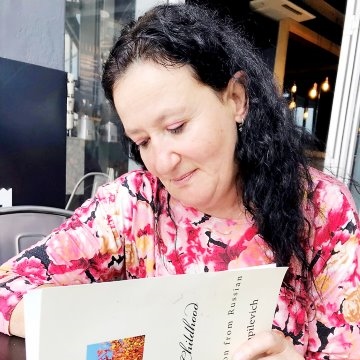
News

A long-awaited insight into a tortured childhood
NICOLA MILTZ
Orit Eloz, 54, never understood why her Russia-born father didn’t love her. She never knew why he was so bitter and angry. She didn’t understand why he never laughed or smiled and would abandon her for long periods of time.
His long, agonising silences remained a mystery to her until a few weeks ago, when she finished reading the first book in an autobiographical trilogy of his life.
This has shed some light into why her childhood was so troubled. The other two parts of the trilogy have been written but are only available in Russian, a language Eloz vaguely remembers.
She left her homeland in Minsk as a little girl after her beloved mother, Ida, passed away, causing her world to fall apart. When she and her father, Boris Kapilevich, arrived in Israel just before the Yom Kippur War, he shut down and closed the Holocaust chapter of his life for good. She was only eight years old.
“He never spoke about the war. He never spoke about his family. It was like they never existed,” she told the SA Jewish Report this week.
She had long ago stopped asking him about his experiences during the war – a subject so taboo, it caused enormous tension whenever it was raised. He remarried a woman who, Eloz claims, was mean-spirited and offered her no comfort.
They left Israel for South Africa in 1979 and she left home, choosing instead to reside at Hillel Hostel in Yeoville when life at home became intolerable. It was here that she met the man she would end up marrying.
Eloz has not seen her estranged father, who now lives in the US, for almost 20 years. She was surprised when he sent her an email about a year ago with an attached copy of his memoir, written in Russian.
“Read it,” he told her in his abrupt way.
“But it’s in Russian,” she replied.
She was at pains to find someone in South Africa who was able to translate it for her. A chance search on Amazon revealed an English copy, translated by her father in February this year, which she immediately purchased.
She spent two days engrossed in the memoir, titled Lost Childhood. The book deals with her father’s early childhood and his harrowing encounters during World War II.
She now knows that he was not always miserable; that he was once loving, kind and sweet.
The memoir tells the story of a once happy, adventurous little boy whose idyllic life was interrupted by the outbreak of war and the German occupation of his hometown in Minsk, the capital of Belorussia (now Belarus). He was five years old when his adoring father was enlisted in the Russian army and he and his beloved mother and brother, whom he idolised, became prisoners of the infamous Minsk Ghetto.
It is an epic Holocaust tale worthy of a film script. It details a journey of survival, pain, loss and fear in which the young Kapilevich witnessed unspeakable horrors and experienced agonising hunger on a daily basis.
His most painful recollection is when his beloved brother Lenya – his protector and mentor – was taken away by German soldiers, never to be seen again. Lenya had only enough time to shove his little brother, Boris, under their bed, before he was captured.
While hiding under the bed, Kapilevich recalls: “Everything happened so rapidly that I even did not have time to feel and understand the horror of loss. I could not comprehend that I am at home and my brother is taken away. It was not possible to imagine even one day he would not be next to me… I feared to move. My body became stiff from cold, but the grief of loss deprived me of all sensations.”
He stayed there for two days until his frantic mother returned, looking for her sons.
“Mom, he hid me under the bed, but for himself, he did not have time,” he cried.
What follows is a gripping drama of pain and suffering until the end of the war, when he and his mother are miraculously reunited with his father.
Eloz is now desperate to read further in a bid to unravel parts of her life which have been kept secret for so long.
“I understand him now. He went through hell,” said Eloz. “He is my father. I now know what he went through. Although I never felt it, in his way he may have loved me.”
The next two books, which she is desperate to have translated, will no doubt give her the answers she craves.




